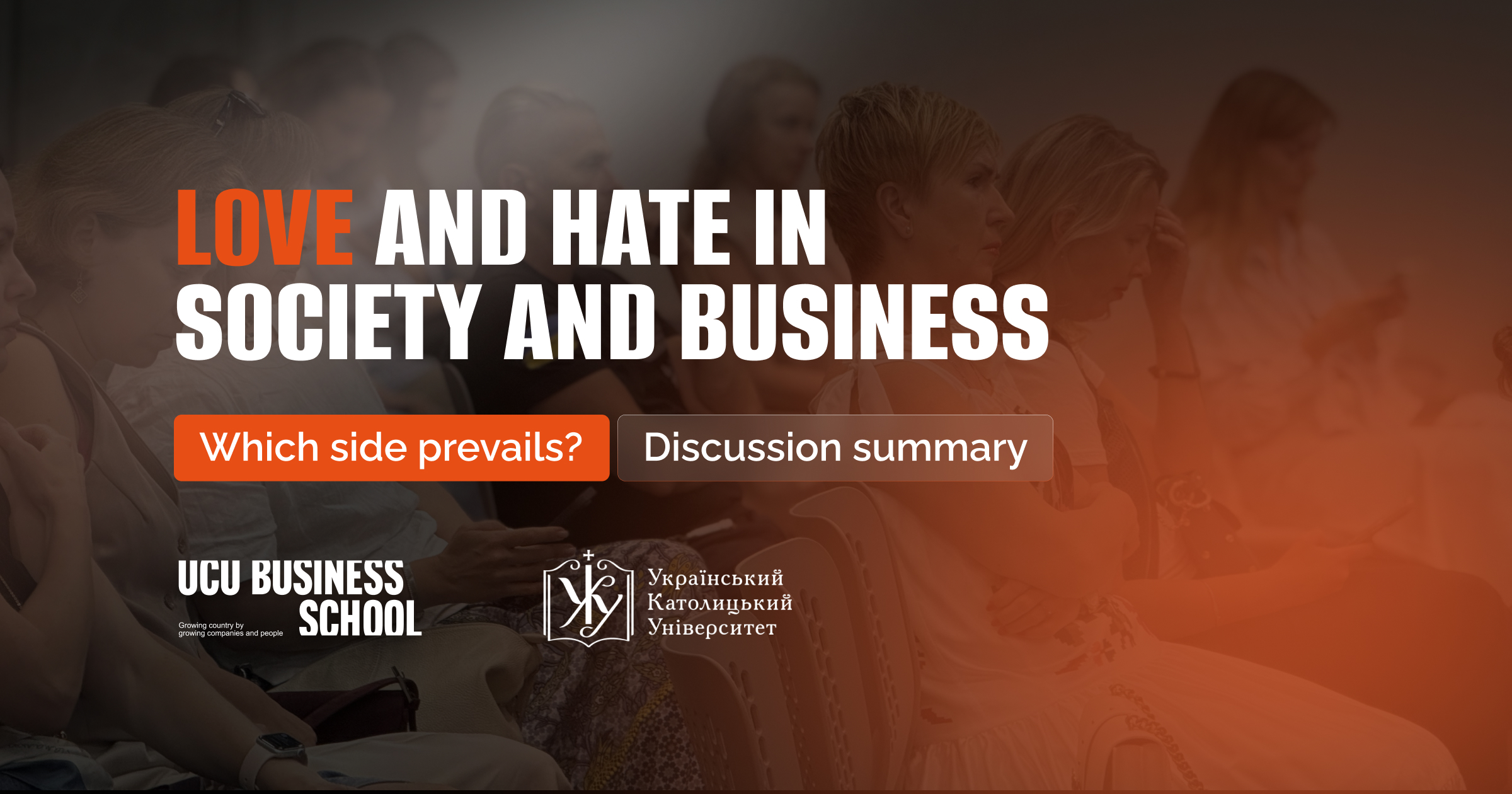“Justice is not just an idea, but a virtue and a certain ability to live by it.” What does justice mean in the context of business? How does business interact with communities? Why does a gap persist between society and business? These and other questions were discussed at the UCU Business School during the event “Justice in Business: Equal Rights and Responsibility”, as part of UCU Days.
The public discussion brought together Renata Delporte – Senior Vice President of HR at SoftServe, Natalia Yakymets – Key Executive MBA alumna, Deputy Director for Research at the International Institute of Ethics and Contemporary Issues, UCU, Oleg Nikulyshyn – Key Executive MBA alumnus, CEO and co-owner of the D.S. pharmacy chain
The conversation was moderated by Natalia Oboznenko, Academic Director of the UCU Business School.

Business as a Reflection of Society
The core theme was justice in Ukrainian business and its interaction with government, communities, and society at large.
Reflecting on the meaning of justice in business, Oleh Nykulyshyn emphasized that it begins with truth and law. For society to be just, he noted, equal conditions and fair competition must be ensured through strong institutions.
“Responsible business and civil society go hand in hand. They must work together to change the rules of the game and create opportunities for fair competition based on knowledge and creativity. That is what justice is all about.” — Oleg Nikulyshyn
Renata Delporte highlighted that justice in business means equal rights and the ability to live by agreements.
Natalia Yakymets summed it up: “Justice is not just an idea, but a virtue and a certain ability to practice it in daily life.”

Is business the healthiest part of society?
The discussion also addressed the mismatch between society’s expectations of business and the responsibilities business should bear towards citizens.
Oleh Nykulyshyn insisted that the gap exists: “When companies enter international markets, restructure, or adopt global standards, it rarely makes headlines. Society is not interested. In our culture, everything is forgiven—except success.”
Still, he noted that Ukrainian society is evolving and undergoing changes and transformations, including cultural ones.
Renata Delporte shared her observations on this topic: “There is a kind of love-hate relationship between society and business. And it has been going on for years. It seems to me that business is often seen by society as a necessary evil. Yet in reality, business is a tool that creates added value, enriches both owners and employees, and strengthens communities. In addition to enriching the owners and the people who work there, it operates on the principle: first, make my apartment beautiful, then clean the stairwell, and then the sidewalk. In other words, the more successful the business, the wealthier the society. But so far, our citizens perceive it as ‘they are making money at our expense, and we are suffering here.’”

She also shared what businesses expect from society: “Learn constantly. What you know today will be outdated tomorrow. If we keep learning, we can earn and build. “Learn constantly. What you know today will be outdated tomorrow. If we learn constantly, we will be able to earn money and build our own businesses. Business is, in fact, the healthiest part of society—it understands the rules of the game and how they work.”
Natalia Yakymets also agreed that there is a stereotype of society towards business and reminded: “Society and business are not homogeneous environments. Society varies, and so do business environments. This must be remembered before showing distrust and prejudice towards businesses.”
Key Takeaways about the interaction between business and society:
- Society often has inflated expectations of business.
- Society expects integrity from business.
- Integrity means: structure, consistency, quality.
- Business expects continuous learning and development from society.
- Business is a reflection of leaders and the culture they embody.
“The values of an organization are the values of its leader.”
Natalia Oboznienko asked participants to share the ethical dilemmas they encounter at work and the challenges they face as leaders. She also quoted Yaroslav Rushchyshyn: “A leader’s values are the organization’s values.”
Natalia Yakymets explained that a defining feature of a leader is the ability to make decisions, especially unpopular ones. Natalia Yakymets explained that a defining feature of a leader is the ability to make decisions, especially unpopular ones, when circumstances require it. She noted that good communication with employees is a valuable skill for a manager.

Renata Delporte recalled a case when she had to lay off 1,800 employees and shared how painful the experience was. She added that ethics in business means following the rules. She also assured that layoffs are painful, but they always mark a new beginning.
Oleh Nykulyshyn, from the owner’s perspective, added: Business mirrors its managers—the culture they foster, the rights they adhere to. And these are established by the leader.
The discussion ended with a wish and advice from Renata Delporte: “If you don’t know how to do something—do it right. If you don’t know how to do it right—do what is good. This applies both in business and in life.”





















